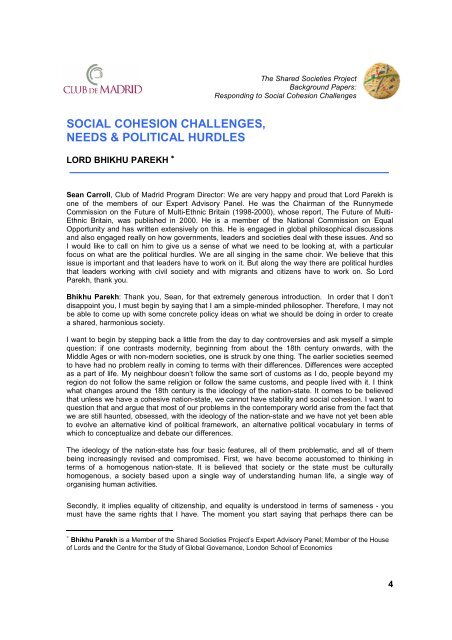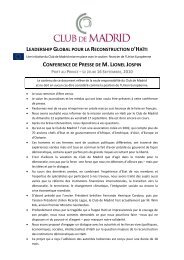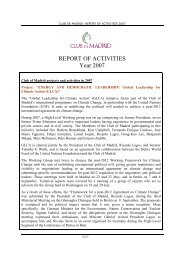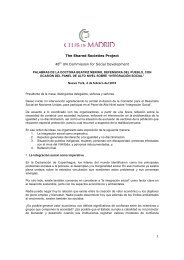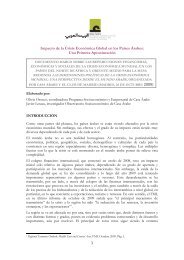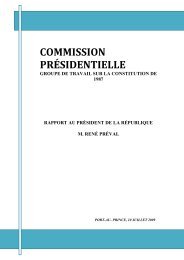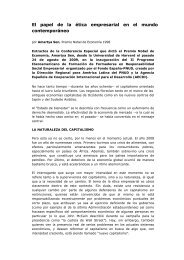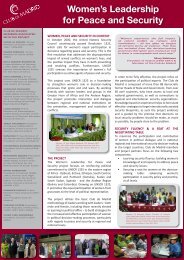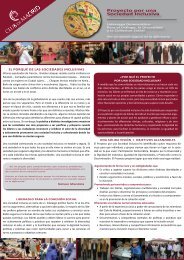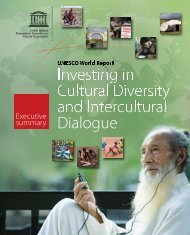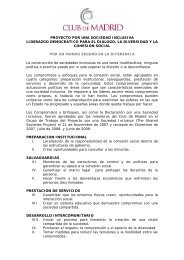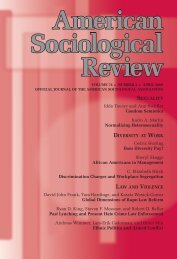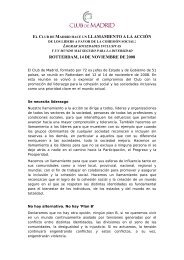Social Cohesion Challenges, Needs and Political ... - Club of Madrid
Social Cohesion Challenges, Needs and Political ... - Club of Madrid
Social Cohesion Challenges, Needs and Political ... - Club of Madrid
- No tags were found...
You also want an ePaper? Increase the reach of your titles
YUMPU automatically turns print PDFs into web optimized ePapers that Google loves.
The Shared Societies ProjectBackground Papers:Responding to <strong>Social</strong> <strong>Cohesion</strong> <strong>Challenges</strong>SOCIAL COHESION CHALLENGES,NEEDS & POLITICAL HURDLESLORD BHIKHU PAREKH ∗Sean Carroll, <strong>Club</strong> <strong>of</strong> <strong>Madrid</strong> Program Director: We are very happy <strong>and</strong> proud that Lord Parekh isone <strong>of</strong> the members <strong>of</strong> our Expert Advisory Panel. He was the Chairman <strong>of</strong> the RunnymedeCommission on the Future <strong>of</strong> Multi-Ethnic Britain (1998-2000), whose report, The Future <strong>of</strong> Multi-Ethnic Britain, was published in 2000. He is a member <strong>of</strong> the National Commission on EqualOpportunity <strong>and</strong> has written extensively on this. He is engaged in global philosophical discussions<strong>and</strong> also engaged really on how governments, leaders <strong>and</strong> societies deal with these issues. And soI would like to call on him to give us a sense <strong>of</strong> what we need to be looking at, with a particularfocus on what are the political hurdles. We are all singing in the same choir. We believe that thisissue is important <strong>and</strong> that leaders have to work on it. But along the way there are political hurdlesthat leaders working with civil society <strong>and</strong> with migrants <strong>and</strong> citizens have to work on. So LordParekh, thank you.Bhikhu Parekh: Thank you, Sean, for that extremely generous introduction. In order that I don’tdisappoint you, I must begin by saying that I am a simple-minded philosopher. Therefore, I may notbe able to come up with some concrete policy ideas on what we should be doing in order to createa shared, harmonious society.I want to begin by stepping back a little from the day to day controversies <strong>and</strong> ask myself a simplequestion: if one contrasts modernity, beginning from about the 18th century onwards, with theMiddle Ages or with non-modern societies, one is struck by one thing. The earlier societies seemedto have had no problem really in coming to terms with their differences. Differences were acceptedas a part <strong>of</strong> life. My neighbour doesn’t follow the same sort <strong>of</strong> customs as I do, people beyond myregion do not follow the same religion or follow the same customs, <strong>and</strong> people lived with it. I thinkwhat changes around the 18th century is the ideology <strong>of</strong> the nation-state. It comes to be believedthat unless we have a cohesive nation-state, we cannot have stability <strong>and</strong> social cohesion. I want toquestion that <strong>and</strong> argue that most <strong>of</strong> our problems in the contemporary world arise from the fact thatwe are still haunted, obsessed, with the ideology <strong>of</strong> the nation-state <strong>and</strong> we have not yet been ableto evolve an alternative kind <strong>of</strong> political framework, an alternative political vocabulary in terms <strong>of</strong>which to conceptualize <strong>and</strong> debate our differences.The ideology <strong>of</strong> the nation-state has four basic features, all <strong>of</strong> them problematic, <strong>and</strong> all <strong>of</strong> thembeing increasingly revised <strong>and</strong> compromised. First, we have become accustomed to thinking interms <strong>of</strong> a homogenous nation-state. It is believed that society or the state must be culturallyhomogenous, a society based upon a single way <strong>of</strong> underst<strong>and</strong>ing human life, a single way <strong>of</strong>organising human activities.Secondly, it implies equality <strong>of</strong> citizenship, <strong>and</strong> equality is understood in terms <strong>of</strong> sameness - youmust have the same rights that I have. The moment you start saying that perhaps there can be∗ Bhikhu Parekh is a Member <strong>of</strong> the Shared Societies Project’s Expert Advisory Panel; Member <strong>of</strong> the House<strong>of</strong> Lords <strong>and</strong> the Centre for the Study <strong>of</strong> Global Governance, London School <strong>of</strong> Economics4
The Shared Societies ProjectBackground Papers:Responding to <strong>Social</strong> <strong>Cohesion</strong> <strong>Challenges</strong>differences in rights, that there might be positive discrimination or some people might have morerights or different kinds <strong>of</strong> rights, you are immediately told that you are moving away from the liberalnotion <strong>of</strong> what a nation-state should be, <strong>and</strong> that is unacceptable. So there exists the idea thatequality <strong>of</strong> citizenship means not only equality <strong>of</strong> rights but the sameness <strong>of</strong> rights.Thirdly, individuals are the basis <strong>of</strong> society <strong>and</strong> we don’t recognize groups or communities.Fourthly, in order for it to be united there must be a direct unmediated relation between theindividual <strong>and</strong> the state. It should not be possible to say, for example, I belong to Quebec <strong>and</strong>through Quebec I belong to Canada, because that would be seen as mediated citizenship <strong>and</strong> Iwould be immediately asked a question, what are you really, Quebecois or Canadian? Or in India,for example, if somebody were to say, we are Muslims <strong>and</strong> we are Indians, the first question thatyou would be asked is but what are you really <strong>and</strong> which is more important to you? Now thisquestion is constantly asked <strong>and</strong> we have to ask ourselves why is this question being asked? Theclassical Athenians or the Romans were not asked this question; during the Middle Ages thisquestion was not asked, it is a peculiarly modern question. Which are you really? The assumptionbeing that you can have only one identity <strong>and</strong> if you have several you must privilege your politicalidentity, your identity as a citizen over all others.So these are the assumptions in terms <strong>of</strong> which the modern state is constituted, with the result thatit has been an extremely violent process. I cannot think <strong>of</strong> any state in human history since the 17thcentury, which hasn’t been created by massive amounts <strong>of</strong> violence. Indigenous people, forexample, how do you bring them into the state? If your assumption is <strong>of</strong> a culturally homogenousstate, then all cultural communities have to be dismantled. Immigrants: what do you do withimmigrants? They are not allowed to carry their own identity. Immigration is seen as a rebirth; yougive up your identity <strong>and</strong> embrace another. Regarding religious minorities, we have seen religiouswars in European history, in India, in Sri Lanka <strong>and</strong> lots <strong>of</strong> other places. The most importantproblem for us, if we are going to cope with divided societies, what I call multi-cultural or multiethnicsocieties, the most important thing for us is to be able to get away from this mindset <strong>of</strong> aculturally homogenous nation-state. Unless we do that, we simply wouldn’t be able to entertainconcrete proposals, because every time a concrete proposal is moved, people will say “Yes, butthis is only until the minorities or these regions are integrated: eventually our goal is to be this kind<strong>of</strong> nation-state.” And therefore, we always think <strong>of</strong> ourselves as in some sense defective, deficient,if we are not a nation-state from this European model.So my first concern is to suggest that unless we revise, radically revise, the way in which we look atthe problem <strong>of</strong> divided societies or what is the history <strong>of</strong> a divided society, we simply will not be ableto get anywhere. We will be multiplying problems, if not now then in the future. So that is pointnumber one <strong>and</strong> it is because we think in terms <strong>of</strong> this kind <strong>of</strong> ideology <strong>of</strong> a nation-state. Thelanguage that we use grows out <strong>of</strong> it. Assimilation, for example, basically means become similar.The assumption is that there is already an established cultural structure in which you are to beassimilated. Or we say assimilation is a French idea; a more Anglo-Saxon idea, more liberal, isintegration. But what does integration mean? This is something that the Parekh Report wasconcerned with, what do you mean by integration? When would you say that minorities orimmigrants are fully integrated? Supposing they take part in the economic life <strong>of</strong> the country,suppose they work as citizens, but continue either to marry among themselves or want to retaintheir own culture - are they integrated or are they not integrated? In Britain at least, we began withthis loose idea <strong>of</strong> integration <strong>and</strong> increasingly point to the minorities saying “look, we know you areeconomically integrated, we know you are politically integrated, but you are still marrying amongstyourselves, you are still retaining your own culture <strong>and</strong> therefore you are holding yourselves back,so you are not integrated. So even the idea <strong>of</strong> integration has this underlying totalitarian <strong>and</strong>assimilationist impulse. And the question that we have to ask - I have written about it but I do notwant to bore you at this time with tricky conceptual questions - is that the whole language <strong>of</strong>5
The Shared Societies ProjectBackground Papers:Responding to <strong>Social</strong> <strong>Cohesion</strong> <strong>Challenges</strong>integration <strong>and</strong> assimilation eventually will have to go <strong>and</strong> we will have to think <strong>of</strong> a new way <strong>of</strong>thinking where people can belong together without necessarily sharing a common substantiveculture. This can happen between husb<strong>and</strong> <strong>and</strong> wife, this can happen in a family, this can happenin a club, this can happen in many organizations. We are mutually committed, we care for eachother, we belong together, <strong>and</strong> we create a common organization without this whole repertoire <strong>of</strong>being integrated or assimilated. So this is the first important point I wanted to raise, since we arelargely concerned with concrete proposals, I wanted to make sure that we define the theoretical ormuch more important philosophical framework in which we think.So the conclusion at the end <strong>of</strong> this argument is that we need a plural political framework, analternative to an ideologically cohesive nation-state. What do we call it? It is difficult to say, becausehistory has just begun to ask these kinds <strong>of</strong> questions. Now, what should be the basic concerns, theinspiring principles <strong>of</strong> this alternative plurally oriented political framework, <strong>and</strong> not an ideologicallycohesive state? I want to suggest that there are five or six things we need to bear in mind. Firstthing is no organization, no political community <strong>of</strong> any kind can come into existence unless it hasbroadly agreed upon certain principles as to how it should be governed. In other words, who shouldhave the power, who has the power to take decisions in the name <strong>of</strong> the community as a whole? Sothe first concern <strong>of</strong> this plural political framework would have to be a basic agreement on theprinciples <strong>of</strong> cooperation. How should this community be constituted <strong>and</strong> equipped to takecollectively binding decisions? On that there can be no compromise. And the ultimate loyalty in thisplural society that I am talking about is to the set <strong>of</strong> constitutional institutions <strong>and</strong> procedures interms <strong>of</strong> which it resolves differences <strong>and</strong> takes collectively binding decisions. No other loyalty isrequired or should be asked for. It will develop in the course <strong>of</strong> time, as it generally does, but this isthe central organizing point.Second, this community has to recognize that individuals are also members <strong>of</strong> particularcommunities. And therefore, the state will consist not only <strong>of</strong> individuals, but also <strong>of</strong> communities<strong>and</strong> groups. And therefore, the distribution <strong>of</strong> rights will have to take into account not onlyindividuals as bearers <strong>of</strong> rights but also group rights, community rights.The third thing that this plural community has to recognize - <strong>and</strong> I am just going to lay downprinciples so we can later apply them to concrete situations <strong>and</strong> ask what are the new ideas that weshould be taking on board - is that because people belong to different groups <strong>and</strong> have differentidentities, political life can become extremely dangerous <strong>and</strong> unstable if it tries to monopolize allother identities <strong>and</strong> does not allow people to express their respective identities. For example, if thestate were to say, “look, your religion, your other things are all your private matters, they should notbe allowed to appear in the public realm; in the public realm only one thing counts <strong>and</strong> that is thestate.” Then what you are doing is requiring them to ab<strong>and</strong>on their religious, ethnic, cultural <strong>and</strong>other identities, which is an extremely heavy price on which to base the state. Such a state, whichonly privileges one identity <strong>and</strong> marginalizes or ignores others, is a politically <strong>and</strong> emotionally costlyenterprise. It will not last long. I can give you examples <strong>of</strong> various countries, including India. Atindependence it had to face the trauma <strong>of</strong> partition <strong>and</strong> reassure its 14% <strong>of</strong> Muslim population.Now, what kind <strong>of</strong> a state are you going to create such that Muslims can feel at home? And the firstthing they had to recognize was that Muslims have their own laws, the civil code, family laws <strong>and</strong>unless the legal system recognizes their civil laws you were asking every Muslim to face the choice<strong>of</strong> loyalty. And therefore, the Indian Constitution very wisely said that Muslims are governed by theircivil laws. Criminal laws are uniform to all Indians, but the civil code varies with the communities.The same sort <strong>of</strong> thing has come to haunt us here in Europe, <strong>and</strong> I do not know if you are familiarwith the statement the Archbishop <strong>of</strong> Canterbury made a few weeks ago, saying that if a Muslimcommunity here is to feel at home <strong>and</strong> not to feel deeply alienated, we will have to find some way <strong>of</strong>recognizing their civil laws within the British system <strong>of</strong> jurisdiction. If that civil law is oppressive <strong>of</strong>Muslim women or children then, <strong>of</strong> course, we should lay down certain general principles, which6
The Shared Societies ProjectBackground Papers:Responding to <strong>Social</strong> <strong>Cohesion</strong> <strong>Challenges</strong>civil law will not violate. But subject to satisfying those general principles, we shall allow the Muslimcommunity in, let’s say, matters <strong>of</strong> adoption <strong>of</strong> children or distribution <strong>of</strong> property or divorce to beguided by a Muslim court - in other words the idea <strong>of</strong> multiple jurisdiction.The fourth important thing one has to recognize is that a plural community <strong>of</strong> this kind must makesure that no community, no individual, is subjected to discrimination. Because ultimately a statederives legitimacy from the fact that all citizens believe that it is neutral, that it will be impartial. Ifcitizens begin to feel that the institutions <strong>of</strong> state cannot be trusted, then that state looses itslegitimacy. And if it looses its legitimacy it has no power to maintain law <strong>and</strong> order. This is, forexample, what tended to happen in almost all European countries that I have known <strong>and</strong> it also hashappened in many <strong>of</strong> the developing countries, where you could not trust the police to be neutral -the police would always side in cases <strong>of</strong> quarrel with the majority community from which they aregenerally drawn. Now, if you cannot trust the institutions <strong>of</strong> the state, the civil service <strong>and</strong> the policeto be neutral <strong>and</strong> impartial, then the citizens are going to want to take the law into their own h<strong>and</strong>s.And therefore, in any divided society it is absolutely vital that there should be a firmly implementedanti-discriminatory policy. And in some cases you have situations where minorities are not fullyrepresented in the institutions <strong>of</strong> the state, for all kinds <strong>of</strong> reasons, <strong>and</strong> therefore some form <strong>of</strong>positive discrimination or affirmative action becomes necessary. I cannot think <strong>of</strong> manycommunities which have not sooner or later been forced to introduce some form <strong>of</strong> positivediscrimination in order to ensure social harmony <strong>and</strong> bring in those communities that have been leftbehind. This is a common policy in India, a common policy in many other countries <strong>and</strong> even herein Britain. The new Equality Bill says that in certain cases, in relation to certain communities youmight have positive discrimination; because that is the only way you can rectify historical inheritedinequalities <strong>and</strong> create an equal playing field for these communities.And I just want to make two quick points <strong>and</strong> then I should stop. The other important thing to bear inmind is, again an increasing problem here <strong>and</strong> in many divided societies, that you generally havecommunities leading parallel lives, lives which do not cross or interact. They might be residentiallyconcentrated so that a whole community goes to its own schools, own restaurants, own shoppingareas <strong>and</strong> has no other meaningful contact with other members <strong>of</strong> that society. This is what I meanor what we mean in this country by ‘parallel lives’ - that people live next to each but that there issome kind <strong>of</strong> invisible border or boundary which is never crossed; <strong>and</strong> your children go to the sameschool without ever meeting somebody from another community. If that happens, at one level thismay have to be lived with because you cannot force people to assimilate. But at another level youare storing up a problem because if you don’t have friendship across ethnic boundaries, if you don’thave meaningful contact then you are vulnerable to all kinds <strong>of</strong> stereotypes about the othercommunities. And those stereotypes in times <strong>of</strong> crisis can be extremely dangerous, whether it isRw<strong>and</strong>a or other places, or Bosnia, where, even when interaction had taken place over large areaspeople lived separate lives <strong>and</strong> therefore were vulnerable to political manipulations. And as far aspossible any social <strong>and</strong> economic policy has to be so designed that communities interact withoutbeing forced, because sometimes when communities withdraw, they withdraw because they areafraid <strong>of</strong> being rejected, they are feeling insecure for all other kinds if reasons. But we need to makesure that our policies, housing policy, our economic policy, employment policy, urban-regenerationpolicy have to be such that no community is left behind <strong>and</strong> that different communities haveoccasions, frequent occasions, to interact with each other <strong>and</strong> build a common underst<strong>and</strong>ing <strong>of</strong>each other.And I think finally, in all communities history <strong>of</strong>ten weighs very heavily, whether it was South Africa,whether it was India or whether it was here in Britain. We do not begin our present <strong>and</strong> plan ourfuture in a vacuum. We begin with people having inherited certain historical memories. So thathowever good your policies are, there is always a danger that the past weighs on you. Youremember what other communities have done to you at certain points in history. Sometimes in the7
The Shared Societies ProjectBackground Papers:Responding to <strong>Social</strong> <strong>Cohesion</strong> <strong>Challenges</strong>Balkans the memory goes back three, four or five hundred years. Now the question is, <strong>and</strong> I havenot yet found an answer, although a lot <strong>of</strong> interesting work has been done, how do you break, howdo you release the burden <strong>of</strong> history? People are creatures <strong>of</strong> memory; they are not just creatures<strong>of</strong> interest. And if your relations with others are mediated by memory, <strong>and</strong> if memory is constantlyst<strong>and</strong>ing in your way, how do you break its burden? It is striking that almost everywhere the mostfashionable language in the last 10-15 years is that <strong>of</strong> apology. Clinton apologized for the wayAmericans treated the blacks; the British Prime Minister is asked to apologize for the British Empire,Australians are apologizing for the way they treated the indigenous communities. And you askyourself why this trend has emerged? I think politicians realize that in order to bring communitiestogether they run up against the burden <strong>of</strong> history, how to exorcise people’s minds so that they areable to trust each other. Now apology is seen as one possible answer but I don’t think it takes usvery far. If for example the British Prime Minister or the French President apologized to the excolonies,what good does it do to anybody? I think we need to find deeper ways. I have looked atfour or five gestures <strong>of</strong> reconciliation, which really achieved what they wanted to achieve. Germanshave behaved well in terms <strong>of</strong> apologizing for what the Nazis have done, generously funding Israel,rewarding people who have been in concentration camps, their survivors <strong>and</strong> others. But all this,while meaningful, did not quite add up to an emotional trigger. When Willy Br<strong>and</strong>t visited Auschwitz,unprompted he fell on his knees <strong>and</strong> there was a tear coming from his eye; a spontaneous gesturewhich worked miracles <strong>and</strong> had a pr<strong>of</strong>ound effect. Now this is one way to take the sting out <strong>of</strong> apainful past. There are many others such as helping those we have harmed in the past by financialcompensation <strong>and</strong> favourable terms <strong>of</strong> trade, but I am not here to talk about them. When we talkabout concrete projects I do not want you to underst<strong>and</strong> concrete merely in a concrete sense <strong>of</strong> oneparticular policy. ‘Concrete’ must include also these emotional triggers, ways <strong>of</strong> emotional release,<strong>and</strong> how to make the past bearable. Thank you very much.8


